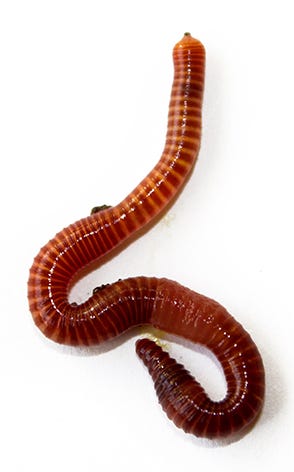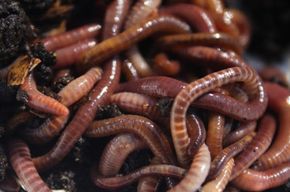Premium High Quality Red Wiggler Worms - Enhance Your Garden's Fertility
Premium High Quality Red Wiggler Worms - Enhance Your Garden's Fertility
Blog Article
Red Wiggler Worms Demystified: Opening the Tricks of Vermiculture for Greener Living and Nutrient-Rich Soil
In the realm of lasting practices for enhancing dirt high quality and advertising eco-conscious living, red wiggler worms play a critical yet often ignored role. Red Wiggler Worms. Comprehending the details of caring for these worms, enhancing their setting, and harnessing their castings can lead to a greener way of living and healthier soil for plants to grow.
The Role of Red Wiggler Worms
Red Wiggler worms play a crucial role in composting systems by effectively breaking down raw material right into nutrient-rich castings. These starved eaters eat a range of natural products, such as kitchen scraps, yard waste, and paper items. As they feed, the worms' digestive system procedures break down the raw material right into a penalty, dark, and nutrient-dense product called worm castings or vermicompost.
The castings created by Red Wiggler worms are very advantageous for soil health and wellness and plant growth. They are abundant in essential nutrients like nitrogen, phosphorus, and potassium, which are important for supporting healthy plant advancement. Furthermore, worm spreadings consist of valuable germs and enzymes that aid improve dirt framework, rise water retention, and boost nutrient uptake by plants.
Advantages of Vermicomposting

It improves dirt framework, improves soil oygenation, and enhances soil dampness retention. Vermicompost also enriches the soil with crucial nutrients like potassium, phosphorus, and nitrogen, promoting plant growth and general dirt fertility.
Additionally, vermicomposting supports sustainable horticulture methods by providing a chemical-free and natural alternative to synthetic plant foods. Red Wiggler Worms. This eco-friendly approach not only enriches the soil however likewise aids reduce reliance on hazardous chemicals, promoting a greener and much more sustainable method of gardening
Setting Up a Worm Bin
When establishing a worm container for vermicomposting, appropriate configuration is important to guarantee the success of the composting process. The initial action in setting up a worm bin is picking an appropriate container.
After adding the bedding, present the red wiggler worms to the container. It is recommended to begin with a handful of worms and slowly increase as they increase. The worms ought to then be supplied with food scraps such as fruit and vegetable peels, coffee premises, and eggshells. It is vital to prevent including meat, dairy products, oily, or salty foods to stop drawing in insects and developing unpleasant smells.
Regularly keep an eye on the moisture levels and temperature level in the worm bin to make certain ideal problems for the worms. With appropriate arrangement and maintenance, the worm container use this link will efficiently transform organic waste into nutrient-rich compost for your plants and garden.
Harvesting Worm Castings
To efficiently gather nutrient-rich worm spreadings from your vermicomposting system, an organized harvesting approach is vital. When it comes time to collect the worm castings, there are a few key steps to follow to guarantee a successful process.

Troubleshooting Common Issues
Determining and attending to typical difficulties that may occur during the vermicomposting process is crucial for maintaining a efficient and healthy worm bin. One common issue that vermicomposters experience is overfeeding. Adding excess food scraps can result in a buildup of dampness and level of acidity in the worm bin, potentially damaging the worms. To avoid this, feed the worms in moderation, ensuring that the food scraps are adequately damaged down before adding more. An additional problem is unpleasant smells originating from the worm container. Foul scents suggest anaerobic problems, commonly triggered by overwatering or inadequate air flow. To fix this, readjust the moisture degrees by adding completely dry bed linen materials like shredded paper or cardboard and increase oygenation by turning the bed linens regularly.
Additionally, if the worm population is decreasing or the worms appear unhealthy, it can be because of environmental stress factors such as extreme temperatures or pH degrees. Keeping track of these factors and making needed changes is necessary for the health of the worms. By troubleshooting these typical problems without delay, vermicomposters can guarantee a smooth and effective vermicomposting process while preserving a growing worm population.

Verdict
In final thought, red wiggler worms play an important role in vermiculture by breaking down natural matter into nutrient-rich soil. Setting up a worm bin is vital for effective vermiculture, and gathering worm castings offers valuable garden compost for horticulture.
As they feed, the worms' gastrointestinal processes break down the natural issue right into a penalty, dark, and nutrient-dense material known as worm castings or vermicompost.
The spreadings created by Red Wiggler worms are very beneficial for dirt health and plant development. Adding informative post excess food scraps can lead to an accumulation of moisture and level of acidity in the worm bin, potentially navigate here hurting the worms.Furthermore, if the worm populace is declining or the worms appear harmful, it could be due to ecological stress factors such as extreme temperatures or pH levels. Establishing up a worm container is crucial for successful vermiculture, and collecting worm castings offers valuable garden compost for horticulture.
Report this page